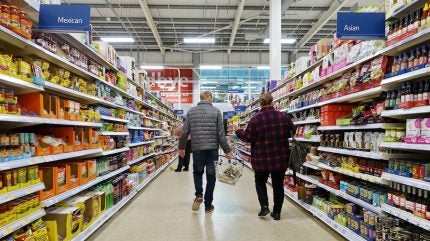
Eighteen of the world’s largest food and beverage companies made an average of $14bn in windfall profits in the last two years, according to a new report by the charities Oxfam and ActionAid.
The analysis, based on Forbes magazine data, covered a total of 722 global corporations across industries. The study said the companies made in excess of $1trn in windfall profits – defined as those exceeding average profits in the past four years by more than 10% – in both 2021 and 2022.

Discover B2B Marketing That Performs
Combine business intelligence and editorial excellence to reach engaged professionals across 36 leading media platforms.
Total profits, meanwhile, were 89% higher than the average total profits measured over the previous period of 2017-2020.
Energy companies were the biggest winners, with 45 companies hauling in an average of $237bn a year in windfall profits in 2021 and 2022. Food and drink companies, however, also saw huge increases, as global food prices to consumers rose (+14% in 2022 alone).
Oxfam said the sum of the windfall profits earned by the biggest food corporations in 2021 and 2022 would have been enough to cover a $6.4bn funding gap needed to deliver life-saving food assistance in east Africa more than twice over.
The exact identities of the 18 companies on the Oxfam and Action Aid list have not been specified, but both Nestle and PepsiCo feature in Forbes’ Global 2000 ranking of the largest companies in the world, reporting annual profits of $18.5bn and $7.6bn respectively in 2022.

US Tariffs are shifting - will you react or anticipate?
Don’t let policy changes catch you off guard. Stay proactive with real-time data and expert analysis.
By GlobalDataJust Drinks has approached both companies for comment on the findings.
Record profits in food and beverage have fuelled accusations that large corporations are failing to do enough to keep products affordable to consumers amid high inflation. Critics have accused brands and retailers of exploiting the cost-of-living crisis to boost profit margins, a practice dubbed “greedflation”.
Supermarkets in the UK, however, have strenuously denied accusations of profiteering, and insist they are doing everything in their power to keep prices low.
“A few increasingly dominant corporations are monopolising markets and setting prices sky-high to line the pockets of their rich shareholders,” said Oxfam’s international interim executive director Amitabh Behar. “Big Pharma, energy giants and big supermarket chains shamelessly fattened their profit margins throughout both the pandemic and cost-of-living crisis. Most worryingly – in the absence of regulation, including progressive taxation – governments have invited this.”
Oxfam and Action Aid said the findings called for a tax on windfall profits to help struggling consumers, people in poverty and in developing nations. They said a 50-90% on the windfall profits of the 722 corporations could generate between $523bn and $941bn annually.
Action Aid secretary-general Arthur Larok added: “Government policy should not allow mega-corporations and billionaires to profiteer from people’s pain. Governments must tax windfall profits of corporations across all sectors – and invest that money back in helping people and deterring future profiteering. They must put the interests of their great majorities ahead of the greed of a privileged few.”
“Taxing windfall profits is smart economic policy – it’s a very clear and direct source of money for development and tackling climate change. Piling more loans onto poorer countries is what makes absolutely no sense when debt is accelerating the climate crisis”.
Speaking to Just Food last week, ING economist Thijs Geijer said whilst large FMCG companies and retailers were better equipped to deal with the impact of inflation on their businesses, there was “no clear evidence” the the average food manufacturer or retailer was benefitting from increases in prices.
“If you look at the broader indicators, I would say there’s no clear evidence that that’s [food manufacturers making excessive profits] the case,” he said. “But at the other end, there’s also not clear evidence that some individual companies might be making some additional profit from this.”



